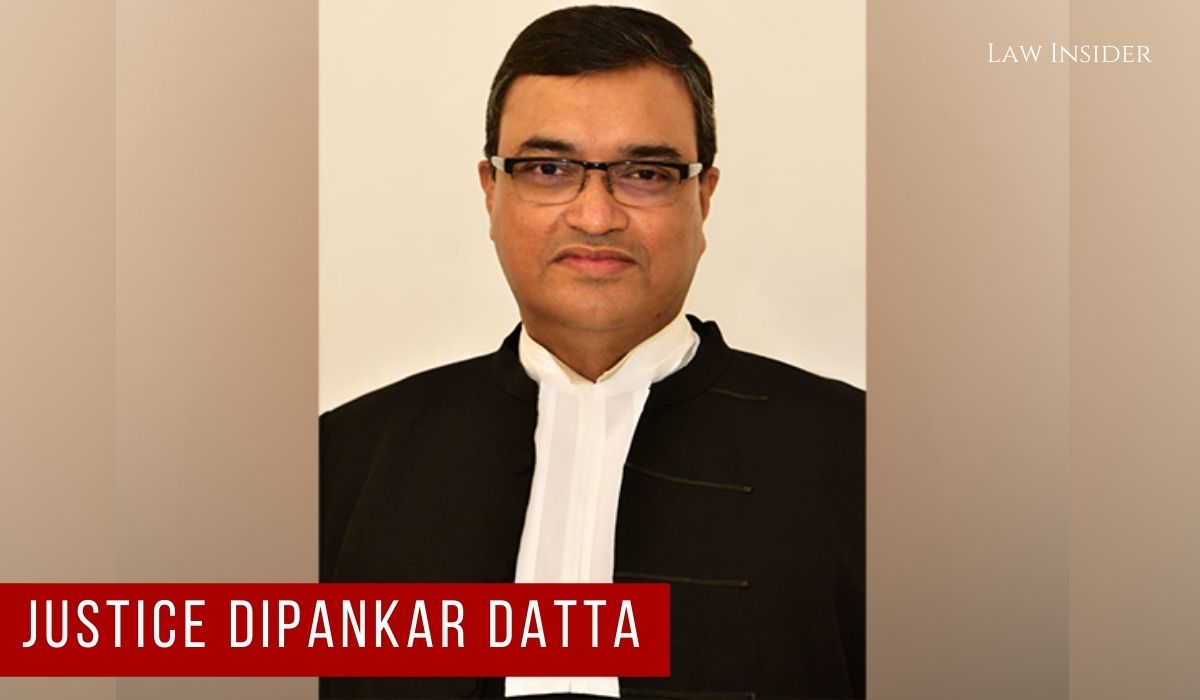Tanisha Rana
Published on: September 27, 2022 at 21:47 IST
Justice Dipankar Datta, Chief Justice of the Bombay High Court, was recommended for elevation as a Supreme Court judge by the Supreme Court collegium, which was chaired by Chief Justice of India U U Lalit, at its meeting on September 26.
On April 28, 2020, Justice Datta, a senior judge at the Calcutta High Court, was named Chief Justice of the Bombay High Court.
After the central government approves his appointment and issues a notification in this regard, he will be promoted to the Supreme Court.
Justice Datta was born on February 9, 1965. He was the son of the late Justice Salil Kumar Datta, a former judge of the Calcutta High Court.
In 1989, he graduated from the University of Calcutta with an LLB. He became a lawyer that same year and dealt with civil and constitutional disputes in high courts and the Supreme Court.
Between May 2002 and January 2004, Justice Datta held the position of junior standing counsel for West Bengal. Since 1998, he has also worked as a lawyer for the Union government.
On June 22, 2006, he was appointed to the Calcutta High Court as a permanent judge.
During the initial COVID-19 outbreak, he succeeded Justice Bhushan P. Dharmadhikari as Chief Justice of the Bombay High Court and oversaw the court’s operation in virtual and hybrid forms.
In addition to addressing the issues of migrant workers during the lockdown, Justice Datta issued many directives to the authorities ordering them to provide medical aid to citizens.
Additionally, he changed the high court’s operating hours from 11 a.m. to 5 p.m. to 10.30 a.m. to 4 p.m.
Prior to him, Justice Anil Dave, who was appointed to the Supreme Court in April 2010, was the last chief justice of the Bombay High Court to do so.
During the pandemic, the state government was given instructions by a court chaired by Chief Justice Datta in July 2020 to minimise prisoner congestion. The bench also criticised the prison administration for the “sorry state of affairs.”
On December 16, 2020, the then-chief minister of the state, Uddhav Thackeray, suffered a setback when a division bench, led by Justice Datta, stayed the collector’s order transferring the 102-acre Kanjurmarg salt pan land to the Mumbai Metropolitan Region Development Authority (MMRDA) for the Metro car shed project after hearing the central government’s appeal through its salt commissioner.
A bench led by Justice Datta held in January 2021 that a “media trial” pending the investigation of any case violates the Programme Code under the Cable TV Network Regulation Act and does have an impact on the investigation by “interfering with administration of criminal justice.”
This ruling was in response to PILs filed by former police officers of Maharashtra seeking restraining orders against “media trial” in the Sushant Singh Rajput death case.
Additionally, on April 5 of last year, a bench presided over by Chief Justice Datta ordered the CBI to launch a preliminary investigation into the allegations of corruption levelled by the former Mumbai police commissioner Param Bir Singh against the state’s then-home minister, Anil Deshmukh.
The bench referred to the case as “unprecedented,” and directed the CBI to do so.
In the same month, Justice Datta criticised the state administration for fire incidents that occurred in hospitals all around Maharashtra and stated that patient safety came first.
In spite of the Centre’s unwillingness to adopt such a policy, a division bench headed by Justice Datta in July 2021 ordered the civic authorities to see to it that elderly and disabled people receive the benefit of COVID-19 vaccine at their residence.
The recommendation by the state council of ministers under then-CM Uddhav Thackeray on the nominations of 12 members to the Legislative Council had been pending for eight months at that point, and Justice Datta stated the seats “cannot be kept vacant indefinitely,” holding it “desirable” for Maharashtra Governor Bhagat Singh Koshyari to make a decision as soon as possible.
The administration currently led by Eknath Shinde recently dropped the 12 names.
In a judgment on a suo motu PIL that expressed concerns about the collapse of unpermitted buildings, a bench of Chief Justice Datta and Justice Girish S. Kulkarni issued a number of directives to the civic organisations and planning authorities in the Mumbai Metropolitan Region (MMR) on February 26 of this year.
The same day, Justice Datta declined to get involved in a PIL challenging a special permission that Lake City Corporation had been given in 2002 to buy land for a private hill station called Lavasa in the Pune district.
He claimed that the “judicial hands-off” approach is best in this case due to the “gross delay” in the PIL’s filing.
However, the court found that NCP leader Ajit Pawar, who was the Irrigation Minister and ex-officio chairman of Maharashtra Krishna Valley Development Corporation (MKVDC), “failed to disclose the direct or indirect interest and was found to be remiss in his duty only to that extent,” as well as “personal interest” and “exertion of influence and clout” by NCP chief Sharad Pawar and his daughter Supriya Sule in the contested project.
On July 29 of this year, CJ Datta gave the Mumbai suburban collector instructions to take action to remove 48 structures, including unpermitted building portions close to Chhatrapati Shivaji Maharaj International Airport (CSMIA) that violated height restrictions and obstruct the runaways’ approach surfaces.
A PIL filed by the Jain Charitable Trusts on Monday asking for a restriction or ban on the advertisement of non-vegetarian food in print and electronic media was dismissed by the judge as withdrawn.
The petitioners were questioned by the high court on why they wanted to infringe on other people’s rights.

